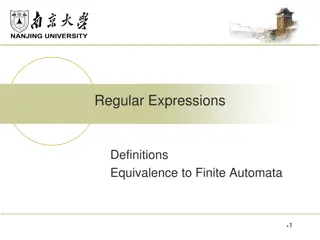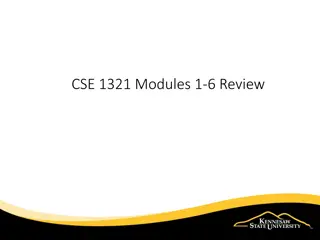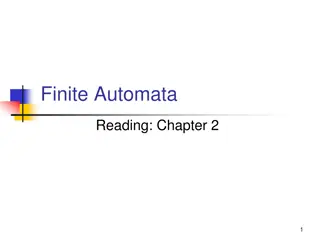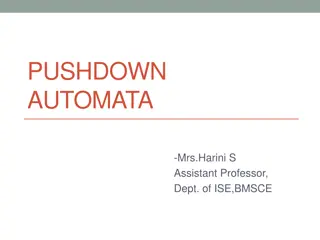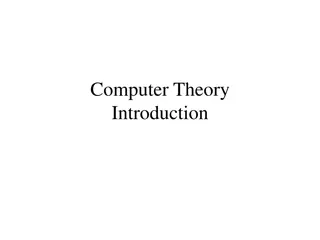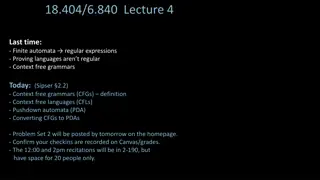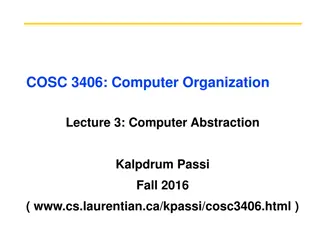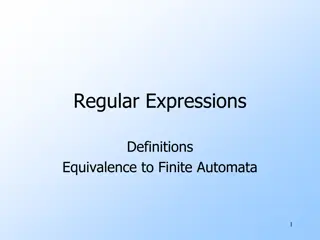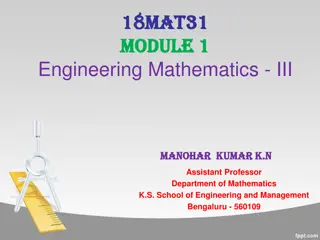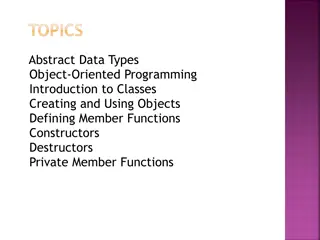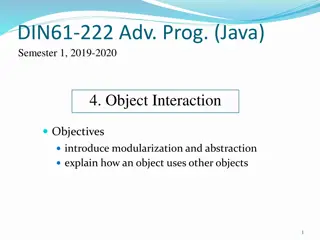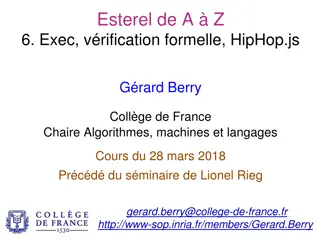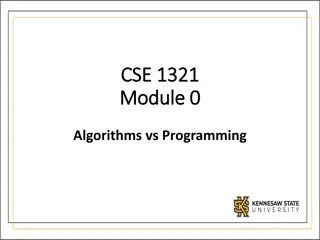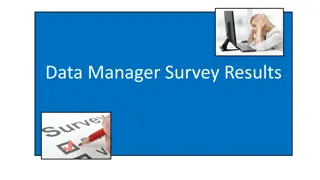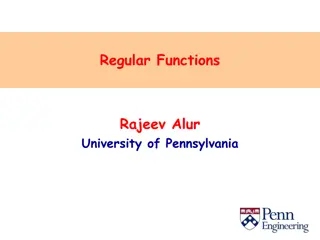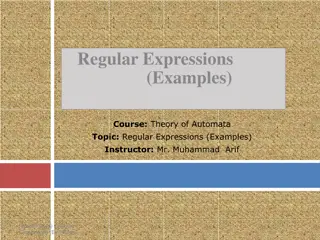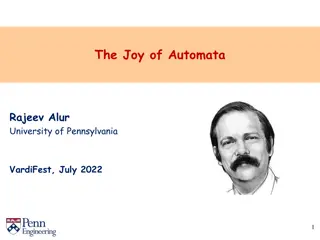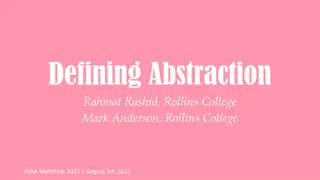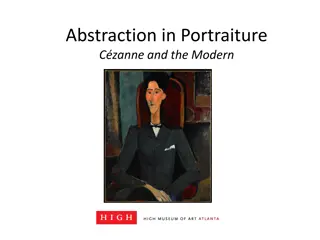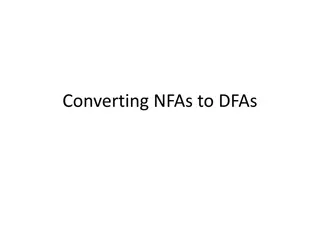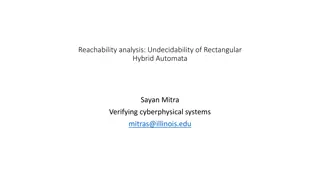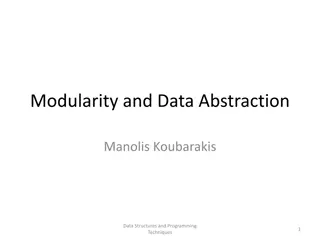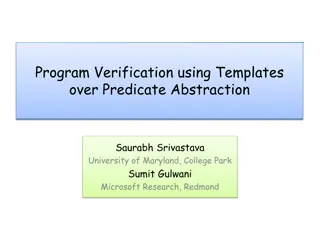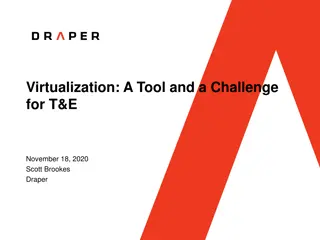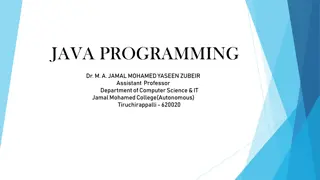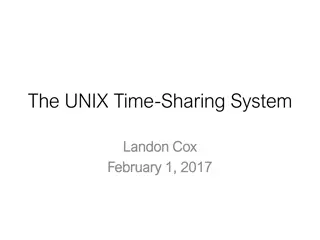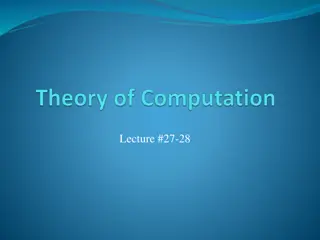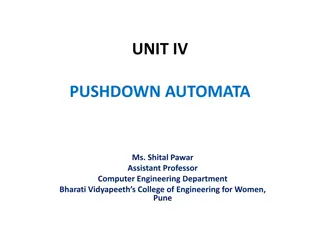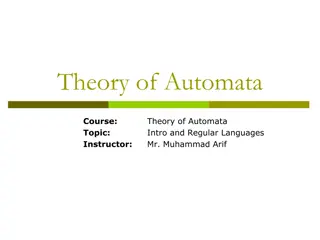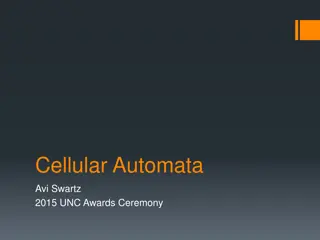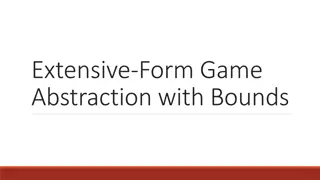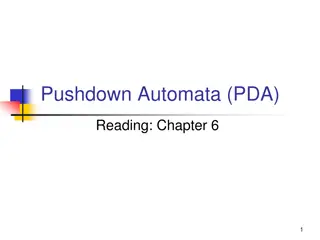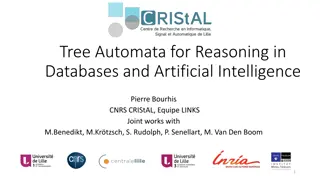Understanding Algorithms and Programming Fundamentals
Learn about algorithms, programming, and abstraction in computing. Explore the definition and properties of algorithms, the relationship between algorithms and programming, and the concept of abstraction. Discover how algorithms are like recipes and how abstraction simplifies complex tasks in comput
1 views • 17 slides
Introduction to Regular Expressions and Equivalence to Finite Automata
Regular expressions (REs) are used to describe languages by algebra and are equivalent to finite automata. They define regular languages precisely using operations like union, concatenation, and Kleene star. The concatenation of languages combines strings from two languages, while the Kleene star re
9 views • 106 slides
Network Function Abstraction A delicate question of (CPU) affinity?
Exploring the delicate balance of CPU affinity in network function abstraction, including challenges, benefits, and solutions like CPU pinning for network workloads. Learn about the impact on performance and scalability, as well as the importance of proper configuration in virtual and physical envir
3 views • 40 slides
Understanding Formal Languages and Automata Theory
This course delves into abstract models of computers and computation, offering essential concepts and principles for understanding the fundamental nature of the computer field. Exploring topics such as regular expressions, context-free grammars, and automata theory, students gain insights into the p
3 views • 11 slides
Understanding Algorithms and Abstraction Concepts in Programming
Exploring algorithms as logical steps to accomplish tasks and abstraction as a way to group concepts for clarity in programming. Dive into flowcharts for sorting algorithms, pseudocode skeletons, and code snippets in various languages like C#, Java, and C++. Learn about handling variables and user i
2 views • 48 slides
Understanding Deterministic Finite Automata (DFA) in Regular Language Theory
An exploration of Deterministic Finite Automata (DFA) in the context of Regular Languages, covering their definition, functioning, application in recognizing input strings, and building a DFA for a specific language. The Chomsky Hierarchy and the significance of Regular Languages are also briefly di
0 views • 41 slides
Understanding Pushdown Automata and Language Acceptance
Pushdown Automata (PDA) provide a theoretical framework for recognizing context-free languages. In PDA, the acceptance of a language depends on reaching a final state or having an empty stack. This concept is illustrated through examples and the distinction between deterministic and non-deterministi
0 views • 10 slides
Understanding Computer Theory: From Automata to Turing Machines
Dive into the world of computer theory, exploring concepts like automata, formal languages, and Turing machines. Learn about pioneers like Alan Turing and the fundamental questions in computer science, from computability to complexity.
1 views • 44 slides
Understanding Context-Free Grammars (CFGs) and Pushdown Automata
Exploring Context-Free Grammars (CFGs) and Pushdown Automata, covering definitions, examples, ambiguity, and conversions. Learn about generating strings, CFG formal definitions, ambiguity in grammars, and more. Connect with the basics of context-free languages and their relations to PDAs. Dive into
0 views • 13 slides
Understanding Computer Abstraction and Performance Metrics
Computer abstraction, instruction count, CPI, and performance metrics like clock cycles, CPU time, and program execution are crucial concepts in computer organization. Through examples and detailed explanations, this lecture explores how architecture, instruction sets, compilers, and algorithms impa
0 views • 27 slides
Equivalence of Regular Expressions and Finite Automata
Regular expressions are an algebraic method to describe languages, specifically the regular languages. They are defined recursively based on symbols and operations such as concatenation and closure. Precedence rules and examples are also provided. The equivalence between regular expressions and fini
0 views • 25 slides
Computational Thinking, Algorithms & Programming Overview
This unit covers key concepts in computational thinking, including decomposition, abstraction, and algorithmic thinking. Decomposition involves breaking down complex problems, abstraction focuses on identifying essential elements, and algorithmic thinking is about defining clear instructions to solv
1 views • 5 slides
Exploring Engineering Mathematics and Automata Theory Concepts
Delve into topics such as automata theory, Turing machines, and mathematical approaches for addition using unary numbers. Discover state transition diagrams and gain insights into the workings of Turing machines in computer science.
0 views • 23 slides
Introduction to Object-Oriented Programming and Data Abstraction
Introduction to object-oriented programming concepts including classes, objects, member functions, constructors, destructors, and abstract data types. Exploring the principles of abstraction in software development, passing objects to functions, and understanding the limitations of procedural progra
0 views • 47 slides
Understanding Modularization and Abstraction in Object-Oriented Programming
Modularization in programming involves breaking down complex problems into simpler sub-parts, while abstraction allows combining low-level details into higher levels. By using modules and abstract classes, software development becomes more manageable and efficient, especially in object-oriented prog
0 views • 39 slides
Formal Verification and Automata Abstraction in Esterel
This content delves into the applications of formal verification and automata abstraction in Esterel, focusing on techniques such as verification by abstraction of automata, boolean verification using BDDs, bounded model checking in SAT/SMT, and more. The work of Gérard Berry at the Collège de Fra
0 views • 38 slides
Understanding Algorithms and Programming: A Visual Introduction
Explore the fundamental concepts of algorithms and programming through visual representations and practical examples. Learn about algorithmic thinking, abstraction, recipe-like algorithms, and the importance of logical steps in accomplishing tasks. Discover how algorithms encapsulate data and instru
1 views • 17 slides
Abstract Domains for Lists and Heap Structures: A Comprehensive Overview
Explore the concepts of quantified data automata on skinny trees, automatic shapes in static analysis, universally quantified properties on lists, heap configurations with skinny trees, and the extension of quantified data automata over lists. Dive into the abstract domain of automata to capture inf
1 views • 20 slides
Satisfiability Modulo Abstraction for Separation Logic with Linked Lists
This study explores the application of satisfiability modulo abstraction in separation logic with linked lists. It presents a technique using abstract interpretation concepts to handle separation logic formulas beyond previous methods, specifically focusing on over-approximating heaps that satisfy t
0 views • 41 slides
Analysis of Data Manager Survey Results in VQI Abstraction
Survey results gathered from 942 notified Data Manager users in VQI abstraction revealed insights on responsibilities, experience levels, backgrounds, and facility types. Responses indicate varying levels of involvement with data collection, team size, and number of facilities managed, providing val
0 views • 27 slides
Understanding Finite Automata and Regular Functions in Computer Science
Exploring the concepts of regular functions, languages vs functions, finite-state computation, finite automata with cost labels, finite automata with cost registers, and examples of Cost Register Automata. These topics delve into the theoretical and practical aspects of defining functions and comput
1 views • 46 slides
Regular Expressions Examples in Theory of Automata
Explore various examples of regular expressions in the context of the Theory of Automata, including defining languages based on patterns such as words ending with 'b', containing double letters, starting and ending with double letters, and more.
0 views • 45 slides
Exploring the Legacy of Automata: Insights from Rajeev Alur at VardiFest 2022
Delve into the fascinating journey of Rajeev Alur's contributions to automata theory, from his early mentorship under Moshe Vardi to groundbreaking collaborations and key insights on automata over infinite words. Discover the essence of automata, its significance in decision problems, and the techni
0 views • 32 slides
Exploring Abstraction in Mathematics: Insights from MAA MathFest 2022
Delve into the concept of abstraction with a focus on diverse perspectives, historical influences, pedagogical approaches, and the process of abstraction itself as discussed at MAA MathFest 2022. Engage with enlightening comparisons and references shedding light on this fundamental mathematical prin
0 views • 7 slides
Understanding Portraits: Realism, Abstraction, and Representation
Delve into the world of portraiture with a focus on realism and abstraction, exploring how artists like Cézanne, Vermeer, and Picasso depict their subjects. Learn the significance of portraits, the difference between realistic and abstract art, and the impact of color on portraying emotions and pro
0 views • 7 slides
Compiler Data Structures and NFA to DFA Conversion
Compiler data structures play a crucial role in the compilation process, handling lexical analysis to code generation. Understanding the conversion from non-deterministic finite automata (NFA) to deterministic finite automata (DFA) is essential for efficient language processing and optimization.
0 views • 10 slides
Automata Theory and Theory of Computation Overview
This course overview covers concepts in automata theory and theory of computation, including formal language classes, grammars, recognizers, theorems in automata theory, decidability, and intractability of computational problems. The Chomsky hierarchy, interplay between computing components, modern-
0 views • 42 slides
Undecidability in Rectangular Hybrid Automata Analysis
The undecidability of the reachability analysis in rectangular hybrid automata (RHA) poses challenges for verifying cyber-physical systems. This complexity was demonstrated through a reduction from the Halting problem of two counter machines by Henzinger et al. Additionally, the review of computabil
0 views • 15 slides
Understanding Modularity and Data Abstraction in Programming
Learn about the importance of procedural abstraction, information hiding, modules, and abstract datatypes in programming. Discover how these concepts help in structuring large programs, improving maintainability, and enhancing data organization and operation control.
0 views • 56 slides
Program Verification Using Templates Over Predicate Abstraction
This research explores a technique that allows for inferring invariants with arbitrary quantification and boolean structure, improving the state-of-the-art in program verification. It can infer weakest preconditions, helping with debugging and analysis by discovering worst-case inputs and missing pr
0 views • 32 slides
Understanding Virtualization: Hardware Abstraction and Hypervisor Concepts
Dive into the world of virtualization with a focus on hardware abstraction and hypervisor technology. Explore the definitions and examples of hardware virtualization, hypervisors, and hardware abstraction, shedding light on how they enable multiple operating systems to coexist on a single physical m
0 views • 21 slides
Fundamentals of Object-Oriented Programming in Java
Object-Oriented Programming (OOP) is a methodology that simplifies software development by using classes and objects. This paradigm includes concepts like Object, Class, Inheritance, Polymorphism, Abstraction, and Encapsulation. Other terms used in OOP design include Coupling, Cohesion, Association,
0 views • 54 slides
Evolution of Data Abstraction in Operating Systems
Explore the evolution of central data abstraction in operating systems from the complexity of Multics to the simplicity and elegance of Unix. Discover how files are managed in Unix, the tradeoffs in data-sharing methods, and the impacts on efficiency and protection.
0 views • 41 slides
Understanding Pushdown Automata (PDA) in Computer Science
Pushdown Automata (PDA) are essential in theoretical computer science, serving as an extension of non-deterministic finite automata (NFA). PDAs incorporate a stack, enabling them to recognize non-regular languages. They are described by transitions involving input symbols, state changes, and stack m
0 views • 46 slides
Understanding Pushdown Automata (PDA) in Computer Engineering
Pushdown Automata (PDA) is a powerful computational model that extends the capabilities of Finite Automata (FA) by incorporating a stack memory. PDAs can accept languages that FA cannot, making them essential in theoretical computer science. They consist of components like input tape, finite control
0 views • 59 slides
Theory of Automata: Introduction and Regular Languages Overview
This course delves into the fundamentals of Theory of Automata, exploring topics such as regular languages, finite state models, grammars, Turing machines, and more. Instructor Mr. Muhammad Arif guides students through essential concepts like finite automata, pumping lemma, decidability, and Chomsky
0 views • 95 slides
Exploring Cellular Automata: A Fascinating World of Rules and Patterns
Delve into the intricate realm of cellular automata, from elementary one-dimensional systems to the renowned Game of Life. Discover the versatility and complexity of these systems, including their capacity for simulating universes and implementing logic gates. Uncover the emergence of life-like beha
0 views • 12 slides
Understanding Game Abstraction and Equilibrium
Extensive-Form Game Abstraction with Bounds delves into the complexities of game abstraction, exploring theoretical guarantees, algorithmic challenges, and equilibrium-finding processes. The difficulty of game abstraction is examined, highlighting issues such as pathologies and the struggle to optim
0 views • 22 slides
Understanding Pushdown Automata (PDA) for Context-Free Languages
Pushdown Automata (PDA) is a crucial concept in the theory of computation, specifically for the recognition of context-free languages. PDAs are an extension of nondeterministic finite automata (NFA) with an added stack memory. This summary provides insights into the definition, transition functions,
0 views • 34 slides
Automata for Query Optimization in Databases and AI
Explore the use of tree automata for reasoning, querying databases using logic languages, optimizing queries through relation algebra, and core problems in query optimization. Learn about data exchange on the web, inference of information from incomplete data, and the semantics of Datalog programs f
0 views • 44 slides

